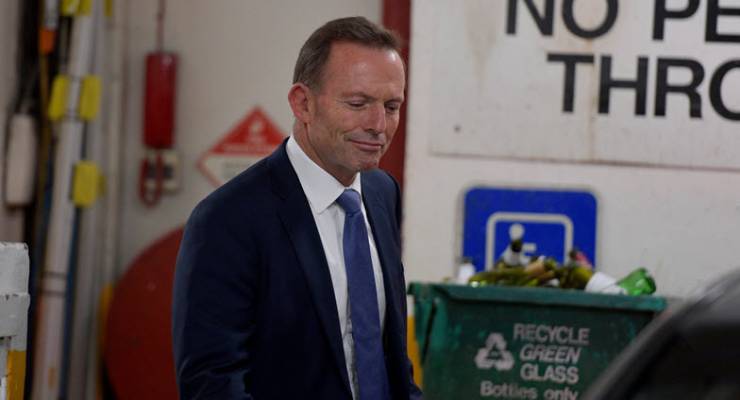
There was a point during Kevin Rudd’s war of attrition against Julia Gillard when his colleagues tried to blast the vengeful former PM into submission.
After Rudd launched a fresh attack from Washington, initiated by his resignation as foreign minister, a conga line of Labor luminaries denounced their vanquished leader in the most strident of terms. The sortie proved counterproductive, however, only encouraging Rudd to dig in further and feel vindicated in continuing the fight.
It’s not often the Liberal Party demonstrates it has learned from Labor’s mistakes, but in this case it may have done so.
So far the only public attempts to shame Tony Abbott from continuing his Rudd-like campaign have been when colleagues commented on the “unhelpfulness” of Abbott’s interventions, or pointed out the “disconnection” between what the former PM did in office and what he is now demanding from Turnbull.
But this week, as Abbott and his enablers used the fairly unremarkable boasts from Christopher Pyne to create fresh momentum for (talk of) a leadership challenge, the Turnbull camp appeared to use a new tactic in response.
Two right-wing ministers — one from cabinet and the other from a junior ministry — told media outlets favoured by conservative audiences that while Pyne’s comments were unfortunate, there was an important role for both moderates and conservatives within the Liberal Party.
This is a departure from the tactic used in February and April by the Liberal Party’s highest-ranking conservative, Senate Deputy Leader Mathias Cormann, who called out Abbott for being self-indulgent and deliberately destructive. Abbott gave Cormann a mouthful in return and then doubled down, while his supporters in the tabloid media claimed their man was being victimised.
[Pyne’s apology is no use, it’s time to hit Abbott at his weakest point]
However, this week’s new approach, while perhaps a bit too subtle for the fans of horse-race politics, is more problematic for Abbott because it weakens his key contention — that the Liberal Party and its base are predominantly conservative.
Any student of politics knows this claim is nonsense, but very few contemporary voters know the antecedents of their favoured political party. So it is significant that cabinet minister Peter Dutton and junior minister Angus Taylor — both touted as future conservative Liberal leaders — went out of their way this week to argue that moderates (or progressives) have a traditional and legitimate role within the Liberals.
In an interview on Sky News, Taylor noted the two streams of thought had always existed within the Liberal Party, and that there had to be recognition that “the factions had far more in common than what divides us”.
Taylor’s comments came just before another up-and-coming conservative and cabinet minister, Christian Porter, told Sky News that Pyne’s remarks had been “beaten up well beyond reasonable proportionality” and that Abbott’s contention that there was “some kind of shift to the left under the Turnbull government” was not sustained by “actually looking at the policy areas”. While this was not an acknowledgement of the legitimacy of moderates in the Liberal Party, Porter was nevertheless rejecting the Abbott camp’s rhetoric.
However, the most telling intervention from the pro-Turnbull conservatives this week came from Immigration Minister Peter Dutton, who in his regular chat with tabloid radio host Ray Hadley warned that “we need to move on before all of this [Pyne] stuff consumes us”.
In response to prompting from Hadley that the government needed an “awakening” that involved the purging of moderates from cabinet, Dutton countered that the success of John Howard during his time as prime minister was that he had “people from the left and the right” in his government, such as Peter Costello who was “accused of being from the left” but was nevertheless a “great treasurer”.
[Abbott-Turnbull: it’s on, but there’s a third player]
Dutton then pressed the point, saying he believed “the Liberal Party operates at its optimum when we do have a broad church, when we do have people across the spectrum”, and that it was good to have a diversity of views in cabinet because “you have a more rounded discussion” and better decisions as a result.
This subtle shift in rhetoric from conservatives in the Turnbull ministry might have been overlooked by reporters and commentators looking for the more obvious signs of conflict between the Liberal party’s factions.
But it won’t have been missed by Abbott. The same senior conservatives that he is trying to peel away from Turnbull because he’s a “moderate” are telling Abbott that moderates are their colleagues-in-arms and not the enemy. This means Abbott’s battle plan for revenge has gone seriously awry.








Unfortunately, it has all gone horribly wrong for Abbott from the day he became PM.
Actually it all went horribly wrong that day for the Australian people ….
You could say it went from bad to worse. Turnbull has been a miserable failure.
The Abbott cabaal will be left out in the snow – freezing their wing-nuts off?
… And three cheers for “good old Homer Dutton”?
It’s a plausible theory all right, but I suspect that Abbott’s ideological cloak covers a wounded ego — something he has in common with KRudd — and he will not be dissuaded by ‘strategic setbacks’. He’s a fighter, in the mould of the (Python) Black Knight.
My gawd, I just love politics. If only it wasn’t so expensive for the tax payers. There’s so much garbage on TV these days, but the Canberra Circus provides light relief for most of us. With so many egotistical performers in the cast, none of us can guess what the next chapter will bring.
The circus also keeps cartoonists hard at work . . . . . . https://cartoonmick.wordpress.com/editorial-political/#jp-carousel-1038
Cheers
Mick
Parse the disaster all you want Paula, but your Rodent’s party was irrevocably stuffed by putting it in the hands of Abbott.